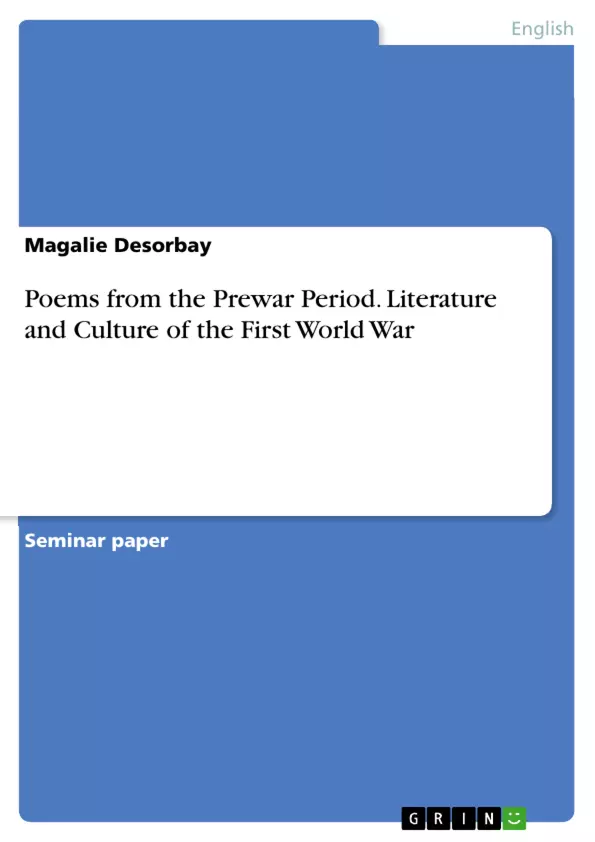The following analysis will be carried out in the light of poems from the pre-war period, underlining the anticipation of war, as well as a play written by R. C. Sherriff. He joined the army and therefore describes the gruesomeness of the events from a realistic point of view. The aim of the paper is to lead from the anticipation and the illusion of a short and glorious war to a more realistic war, representing hell to its fighters.
The beginning of the First World War, also known as the Great War, was marked by the assassination of the Austrian – Hungarian heir apparent, Franz Ferdinand, and his wife on the 28th of June 1914 in Saravejo. From then on, Germany relied on their alliance and additionally, Russia and Serbia became allies. Before the assassination, Germany was already isolated from the other countries except from Austria. During war, the country fought on the West front with France and on the East front with Russia. The fighting assemblies can be divided into Germany with Austria – Hungary and the Ottoman Empire on one side and Great Britain, Russia, France and also the United States on the other side (from 1917 onwards). On the 11th of November 1918, two days after the abdication of Emperor Wilhelm II, the war ends. The Great War was a war led by machines, showing the power of modern weapons.
Inhaltsverzeichnis (Table of Contents)
- Introduction
- The beginning of the First World War
- Pre-War and Early War Poems
- Kipling (For All We Have and Are, My Boy Jack)
- Brooke (The Soldier)
- 1916
- R.C. Sherriff (Journey's End)
- Conclusion
- Bibliography
Zielsetzung und Themenschwerpunkte (Objectives and Key Themes)
This paper aims to analyze the progression from the anticipation of war to the reality of its brutality through the lens of poetry and drama. It explores the changing perspectives on war as it evolved from a perceived short and glorious conflict to a horrifying experience for soldiers and civilians alike.
- The impact of propaganda and societal attitudes on the initial acceptance of war.
- The disillusionment experienced by soldiers and poets as they confronted the reality of trench warfare.
- The portrayal of war in early poems and its contrast with the grim depiction in later works.
- The shift from idealistic notions of heroism to the stark reality of loss and suffering.
- The enduring legacy of the First World War on the consciousness of society and literature.
Zusammenfassung der Kapitel (Chapter Summaries)
- The introduction sets the stage by highlighting the profound impact of the First World War, emphasizing its lasting effects on society and literature.
- The chapter on the beginning of the First World War examines the political and social context leading to the outbreak of the conflict, focusing on the role of propaganda and the widespread naivety regarding the consequences of war.
- The chapter on pre-war and early war poems analyzes the idealistic and patriotic tone of this period, exploring the contrast between the perceived glory of war and the actual brutality experienced by soldiers.
Schlüsselwörter (Keywords)
This analysis delves into the themes of war and its representation in literature, focusing on the shift from idealistic conceptions to the harsh reality of trench warfare. Key terms include pre-war anticipation, disillusionment, heroic narratives, propaganda, and the impact of the First World War on societal consciousness.
- Quote paper
- Magalie Desorbay (Author), 2018, Poems from the Prewar Period. Literature and Culture of the First World War, Munich, GRIN Verlag, https://www.hausarbeiten.de/document/1430217


